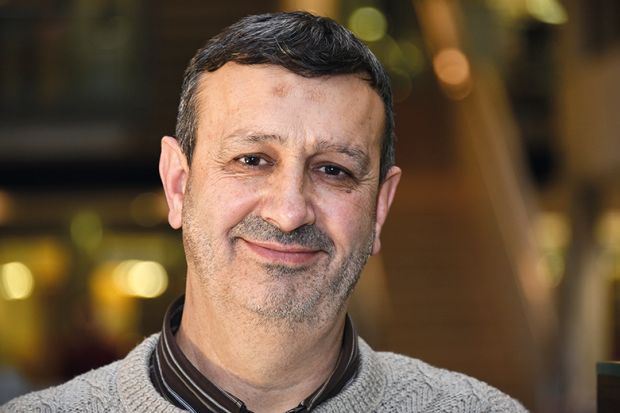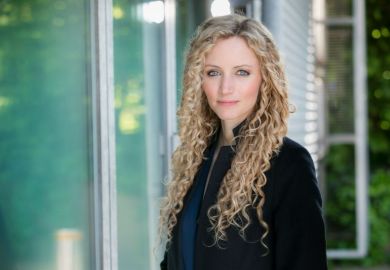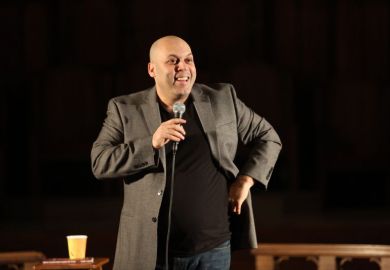Forced to flee Syria in 2016 after fighting erupted around his home near Damascus, Gabagh Kablou, a historian of ancient Syria and Iraq, now lives in Germany and is researching once again at Friedrich-Schiller-University Jena. He is now being supported by the Philipp Schwartz Initiative, which pays for threatened foreign academics to take up a two-year research fellowship at a German university or research institution. Named after a Jewish pathologist who had to flee Nazi Germany in 1933, the initiative has to date awarded 159 fellowships, overwhelmingly to scholars from Turkey and Syria. Before leaving Syria – to which he hopes to return – Professor Kablou taught ancient history for more than two decades at the University of Damascus.
When and where were you born?
I was born in Damascus in 1962.
How has this shaped you?
Damascus is an ancient and oriental city – it combines East and West with modern and old places. That special atmosphere, and the people of Damascus, shaped my passion for history, my thoughts and my principles.
What was your first memory of an interest in archaeology?
I was born in a city where civilisation started. One is surrounded by [memorials to] historical events and historically important persons. People in my city value knowing the history of their country. As students, we always had trips to national museums, and this aroused my interest in history.
What was it like to teach ancient history in the cradle of civilisation?
You feel right in the middle of all the historical events you are teaching – that is a great honour.
When did it become too dangerous for you to remain in Syria?
In Syria, all people are in danger, no matter what, in everyday life. But it came to the point where it was very dangerous for me just to go to work or to let my kids go to school. We lived in a house in the countryside of Damascus, and there were constantly rockets hitting our children’s school – and one time my car. The fighting near our house did not seem like it was going to end, so we fled to Damascus city. Finally, my wife and I decided to leave Syria in 2015.
How did you get to Germany with your family?
First, my wife came by plane; then, after a year, my children and I came through family reunion in 2016.
What damage has the war in Syria done to its ancient archaeological sites?
It depends on where these sites are. Certain places, for example in Idlib or al-Hasaka, were completely destroyed. In contrast, we were able to save some important places, for example on the coast. The war is unfortunately not the only danger, as lots of important places are threatened by the theft and [sale of artefacts] through black markets [to buyers] abroad. Moreover, [the danger threatens] not always just ancient archaeological sites, but also museums, which store a lot of finds – these were also partly destroyed or stolen. Very often, we could not reach them to save their artefacts.
How did Syrian archaeologists manage to get some artefacts to safety?
In some places, museums were closed, and many treasures were kept safe in special depots. The Syrian authorities also tried to cooperate with the local community to secure the rest.
Can archaeologists continue to study war-damaged sites where artefacts have been destroyed?
There are a few ways that allow us to continue to study these sites. First, we can try to restore them as far as possible and to save what we have left. Or we can use new technical methods to reconstruct these places on paper in order to continue working on them and researching.
Will it ever be possible to return looted artefacts to public museums or universities for study? Is it possible to ever buy them back?
Getting these archaeological artefacts needs international cooperation because the Syrian government alone would not be able to get them back. Also, any acts of theft must be prosecuted and punished. And it is very important that other cooperative countries that find these artefacts send them back to the respective home countries and do not use them for self-interest.
Islamic State became notorious for destroying ancient artefacts in Syria, claiming that they were idolatrous, yet also selling some to fund its campaign. What did this do for the reputation of IS among ordinary Syrians?
IS represents a very small group of people, and they have always had a bad reputation. So the Syrian people have never been a good incubator for the group – but sure, their theft [from] and destruction of ancient sites did harm their image.
At what point do you think it will be safe to return to Syria?
In the near term, the conditions in Syria will not allow me to return safely.
What are you researching now in Germany?
I am working on a project looking into the history of archaeological excavations in Syria in the 19th century, with Carola Dietze, a professor of modern history at Friedrich-Schiller-University Jena. They are supporting me with all the materials I need – I am very glad to be working with them.
david.matthews@timeshighereducation.com
Appointments
Michael Murphy has been elected president of the European University Association. The former University College Cork president succeeds Rolf Tarrach, the former University of Luxembourg rector who had been president since 2015. The EUA president serves a four-year term. Professor Murphy has held a variety of leadership roles, including spells as vice-chancellor of the National University of Ireland and chair of the Irish Universities Association. He graduated in medicine from University College Cork and received his doctorate from the National University of Ireland. Professor Murphy competed with Martine Rahier, the former rector of the University of Neuchâtel, for the EUA presidency.
Glenda M. Prime has been named the new dean for the School of Education and Urban Studies at Morgan State University in Baltimore, Maryland, stepping up from her role as a professor at the institution. She said: “Urban learners within the K-20 spectrum [higher education] face myriad challenges – some old, some new – that demand bold and innovative approaches to teacher preparation, research that seeks answers to some of the most persistent problems of outcomes disparity, and the formation of effective partnerships between higher education and the K-12 [schools] sector.”
Najma Akhtar has been appointed the first female vice-chancellor of Jamia Millia Islamia, New Delhi. The university said the appointment was a “progressive landmark in the history of educational leadership and a matter of pride for Jamia Millia Islamia”.
Muneer Iftikhar Ahmad has been named the Sol Goldman clinical professor of law at Yale University. Professor Ahmad, who will take up the post in July, focuses his teaching, scholarship and practice on the intersections of immigration, race and citizenship in both legal theory and legal practice. Before joining Yale, he was professor of law at American University Washington College of Law.
Joan Cooper has been named a commissioner for Australia’s Tertiary Education Quality and Standards Agency. Professor Cooper has served in senior positions at a number of universities including UNSW Sydney, Flinders University and the University of Wollongong.
Register to continue
Why register?
- Registration is free and only takes a moment
- Once registered, you can read 3 articles a month
- Sign up for our newsletter
Subscribe
Or subscribe for unlimited access to:
- Unlimited access to news, views, insights & reviews
- Digital editions
- Digital access to THE’s university and college rankings analysis
Already registered or a current subscriber?








